In the run up to the monsoons, tree trimming or pruning in Mumbai is a regular affair.
Brihanmumbai Municipal Corporation (BMC) Garden Department takes care of the trees on the roads and public spaces, and it used to do this in individual housing societies as well, on request. However, BMC recently announced that societies would now need to take the responsibility for the trimming of the trees in their premises, and bear the costs, after getting BMC permission.
A few days ago, the exercise of “tree trimming ” was carried out in the society where I live, Gitanjali Cooperative Housing Society in Andheri West, Mumbai. The management of the society had obtained the permission to trim the trees from the Garden Department of BMC K-West Ward, but what it actually did was far beyond that. It was surprising to see that they had sought police protection to carry out what can be called a heinous environmental crime.
Why do trees need to be trimmed/pruned?
Trees in the wild are not pruned, so what makes this necessary in an urban setting? As the word “prune” suggests, it keeps trees looking aesthetically good. The other reason is safety of life and property.
During the rainy season, Mumbai city regularly experiences cyclones and strong winds. Tree branches get broken off, and dislodged. Trees get uprooted. Falling trees and branches are known to have caused deaths and injured people, apart from damaging buildings, vehicles, overhead cables and other assets. On average, BMC receives 600 tree-fall complaints a month, between June and September every year. Pruning the trees before the rains is done in the hope that it will prevent such accidents from happening.
Trees and branches can also fall during the non-rainy season if there are winds or if they are disturbed by construction and other such human activity. Shallow rooting, concretisation of roots, imbalance in growth, water logging, disease/ predators like white ants and rats are some of the factors that could make trees susceptible. It could also be that dry and dead branches may be holding on by a thread, ready to fall anytime. If trees are periodically examined, appropriate pruning minimises the chances of unexpected falling incidents.
When branches of trees grow too close to a building or power lines, or they rub against each other, it could become unsafe. In these situations, it becomes necessary to have them trimmed.
Pruning is beneficial only if done sensibly and properly. Every branch that is cut, has an impact on the health, growth and life of the tree.
Read more: Keeping Mumbai green: Citizens replant fallen trees, but that’s not enough
How are the trees being trimmed in Mumbai?
For the most part, tree trimming in Mumbai is done arbitrarily, unscientifically, and quite often, results in imbalance of the trees.
In an article published in Freepressjournal.in in Aug 2020, environmental activist, Zoru Bhathena said, “Despite pruning and trimming thousands of trees every year ahead of monsoon, latest data by the Brihanmumbai Municipal Corporations (BMC) disaster management unit has revealed that on an average, they receive over 2,000 tree fall complaints every year. The major factor for this is the wrong method of trimming trees adopted by the civic/contract workers on the job over the years. It is observed that those involved in tree trimming/pruning, mostly trim them from below, instead of the top. So, you will see that Mumbai is the only place where there are tall, top-heavy trees, which are weak below. As a result, in heavy rains and gusty winds, these trees are prone to falling.”
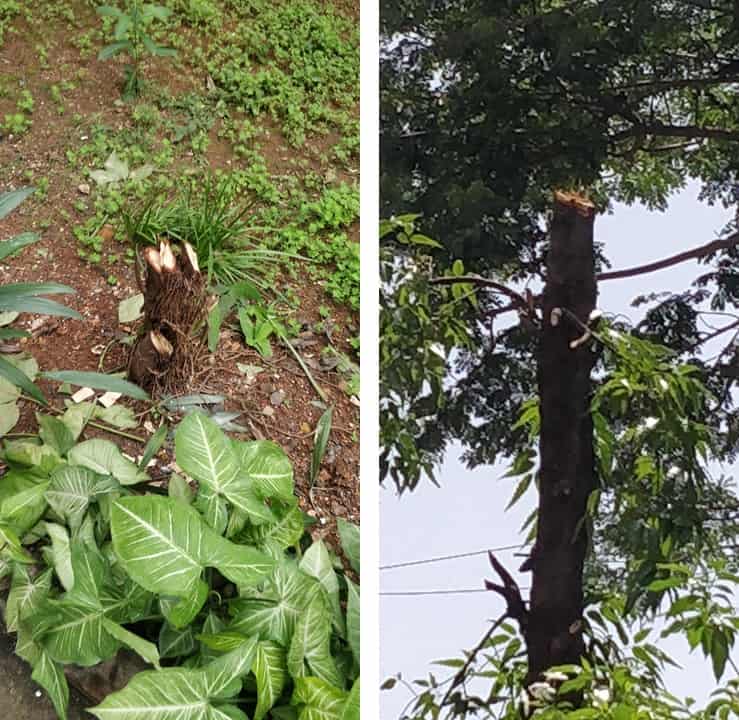
Year after year, BMC’s tree pruning has come under criticism. Even Thane Municipal Corporation has been taken to task. The National Green Tribunal (NGT) Western Zone Bench, Pune, in its judgement on application number 157 of 2016 quotes from literature on the rationale for pruning and the effects of over-pruning, as follows.
“Regardless of the state of life, there is no harm in removing the portion of branches that are dead, broken, spilt, dying, diseased or rubbing against each other. However, indiscriminately removing branches with live foliage can reduce tree health and encourage development of weak structure. Anytime live branches are removed, some live wood transitions to non-living wood behind even a well-executed pruning cut. This must be balanced against the improved structure that results from structural pruning. Removing a few small diameter branches typically has little effect.”
“A large or profuse cut leads to decay. Any cut made on a tree is a wound that must be healed. The fewer cuts made, the better. Smaller cuts throughout the tree’s life are better than large cuts that should have been made many years ago when the tree was small. One large poorly made cut or too many cuts in the wrong places can ruin a tree for life.”
Despite the bad experiences of the past, in the last week of May, BMC awarded tree trimming contracts to desilting/ transport companies rather than those adept in tree pruning. The requirement of an aborist (tree surgeon) to be a part of the contractor team was excluded.
It is also quite ironical that the pruning (which in Mumbai is cutting off branches and main trunks) happens in spring/peak summer, when everyone is looking for the shade of trees to hide from the scorching sun. This is the time of the year when trees flower and fruit, using much of their energy. Making cuts in trees at this time is stressful for them. If done scientifically, pruning can be done through the year.
In private societies, tree trimming permission is often used to butcher trees in a way that their survival is uncertain, or chop them off if they are seen to be inconvenient to have around.
Process to get permission to trim a tree in a society
To cut the branches of a tree or to cut a tree, citizens need to get the permission of the BMC. This can be done through the BMC (MCGM) website’s Application to Lodge a Complaint [choose Garden & Tree – Permission for Tree Trimming]. The website also provides a checklist of documents that need to be submitted and the time frame for grant/rejection.
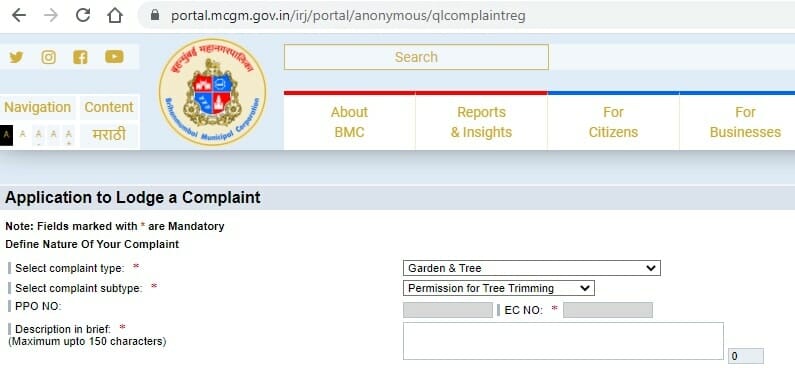
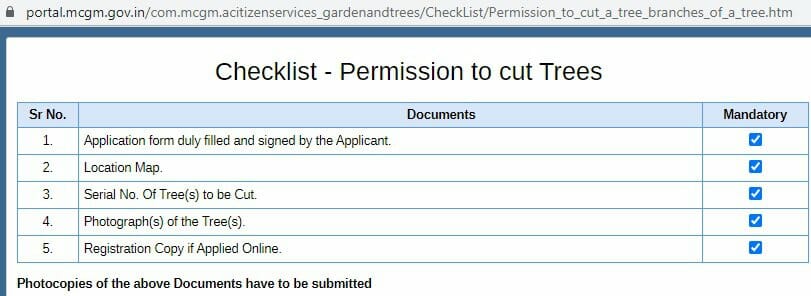
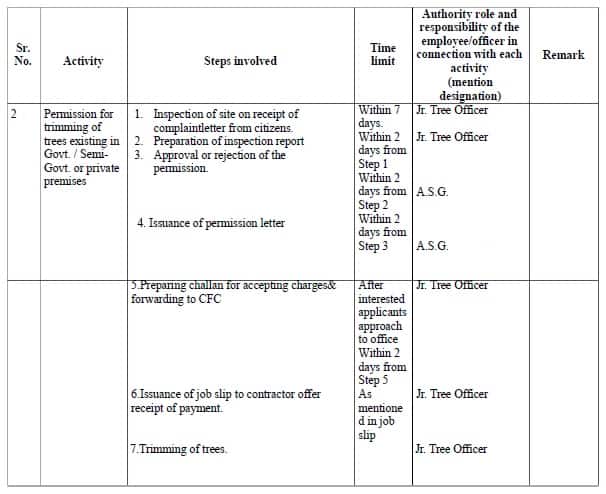
Pruning can be done by a contractor appointed by the BMC or a private contractor. Pruning costs will need to be paid to the relevant contractor who will need to take the responsibility for the disposal of the branches. Prior to the monsoons especially, BMC tries to expedite the permission approval.
After permission, what?
Trees and their leaves reduce pollution thereby enabling a clean environment. They help in controlling global warming, provide oxygen and cool shade. They also serve as a home, providing shelter to many birds and other living creatures. Therefore, trimming needs to be done by people who know how to trim trees – through experience and/or training. However, as we see all around Mumbai, this is mostly not the case.
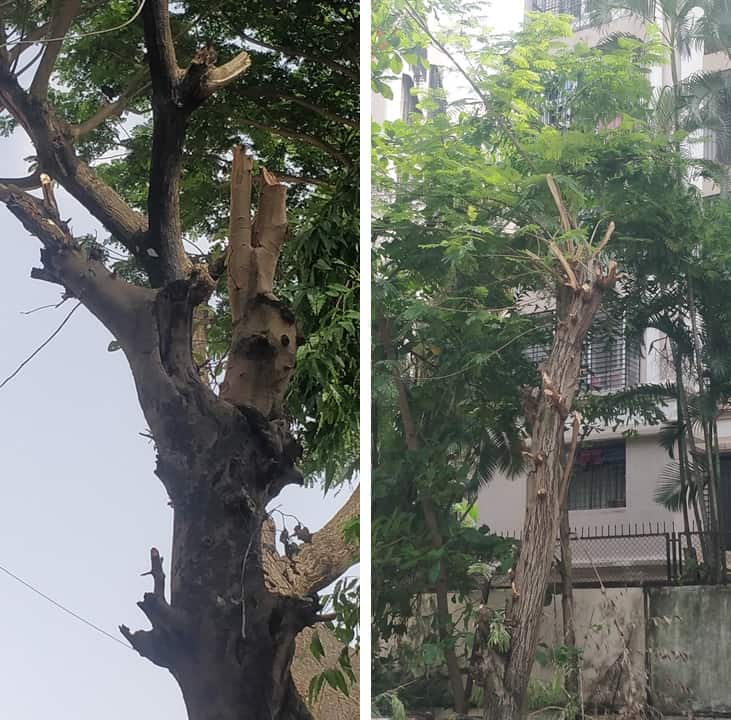
Coming back to our society, the “trimming” that was done a few days ago was extreme. The destruction was so severe that many of the trees were totally beheaded and others have been left with very few branches and leaves. Some of the trimming has been asymmetric which will lead to the loss of the balance of these trees. While chopping off branches, the nests of birds were not spared. June to September is the breeding period for many species of birds and destruction of their nesting areas violates Section 9 of the Wildlife Protection Act 1972.
Prohibition of hunting.—No person shall hunt any wild animal specified in Schedules I, II, III and IV except as provided under section 11 and section 12.
Section 9, Wildlife Protection Act 1972
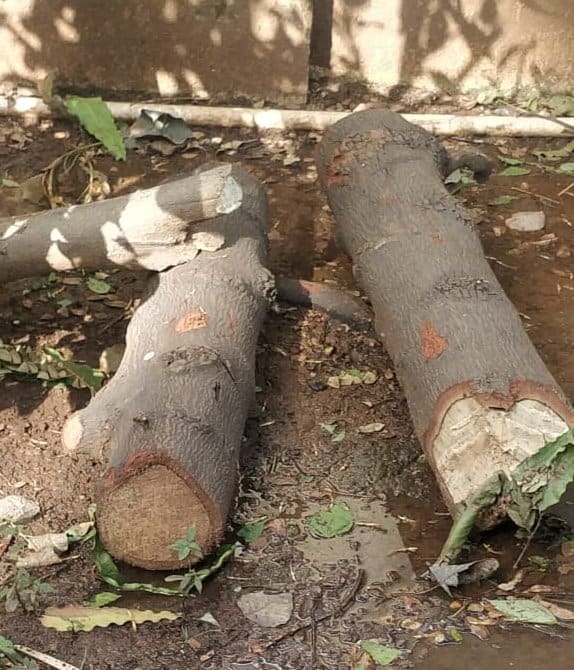
Such cruelty to the environment has happened before. Apart from haphazard trimming of trees, concretisation of their bases is common. It is known that concrete around trees weakens them and hinders their growth. As per the NGT Order of 2013, “no concrete or construction or repairing work is done at least within one metre radius of the trunk of trees.”
Some of us have reported the incidents to the concerned authorities in the past. The Garden Department of BMC K-West Ward issued notices to the Management Committee warning them that trees could not be cut without their permission. They did site inspections and instructed them to take care of the trees and remove concrete at their bases to enable their growth. The notices were ignored. The BMC was clear that crimes were being committed and issued a letter to the police (November 2018) seeking action, but nothing noticeable was done by the police.
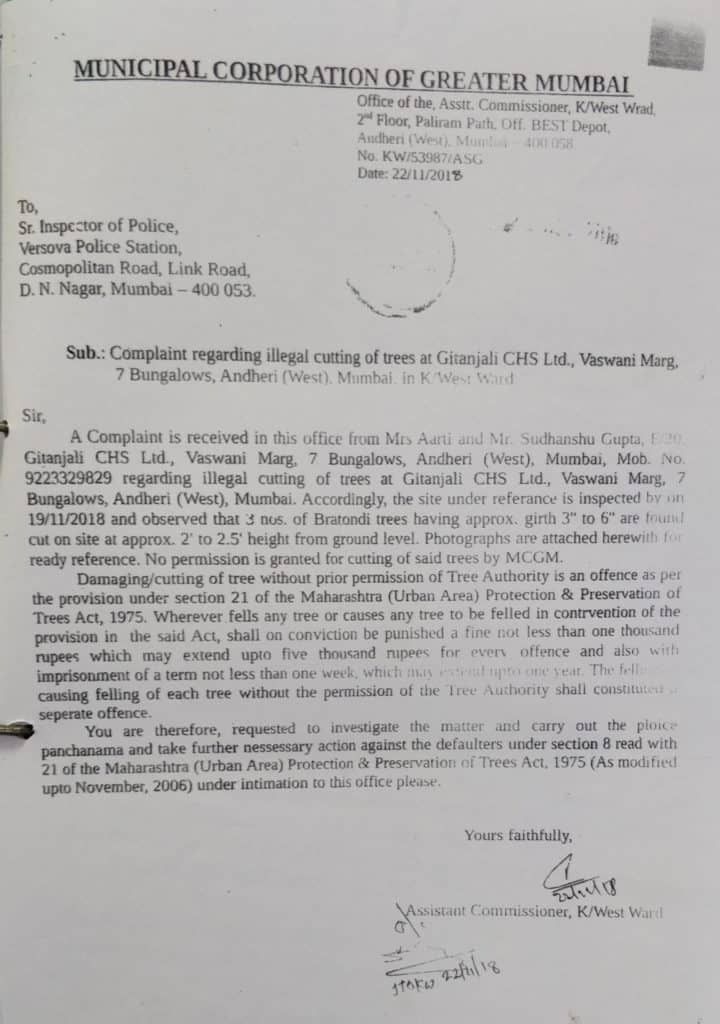
This time, the Management Committee got the permission of BMC’s Garden Department before the trimming was carried out. The trimming was executed by an authorised BMC contractor, Mr Sheikh, who has no understanding of scientific tree trimming. We have seen a replay of the same mauling that had happened in earlier years. On what basis did BMC give approval to a defaulting society, after their earlier notices received scant respect? If the BMC issues tree trimming permission to an applicant who has previously violated the law and continues to do so through inaction, then the concerned BMC officials need to be deeply investigated. Further, this time policemen were present while the crimes were carried out, encouraging the violations, which brings us to the question of whom do we go to, to get justice?
Apart from destroying animal habitat, the massive over-trimming/cutting of trees causes harm to both the trees and us humans. We’ve been trying to get justice for the trees and the birds, and for ourselves, for almost ten years. Nothing concrete has been done till now which is very discouraging. We seek that stern action be taken as per the Maharashtra (Urban Areas) Protection And Preservation of Trees Act 1975 . The laws are in place. We need them to be firmly enforced.
[This article from a citizen journalist was co-authored by Arathi Manay Yajaman]
Really appreciation note.
In my society, instead of trimming, 30′ tree cut after every 4-5 month.
From the ground, 3-5′ only left.
When trees grow full, many birds came there.society taking permission from NMC or not , don’t know,
Society servant who cut the trees getting free wood for cooking.
I am feeling , its like a murder of beautiful tree.
Thanks for publishing this article.
Please keep supporting my efforts to safeguard community animals,trees, naturebeings and their natural habitats.
Thanks 🙏
Similar story everywhere. It’s hopeless. There is no one who gives a damn about this. We can try as much as we want but when the municipal bodies themselves are filled with corrupt illterate scums what can we do
Great explanation, simple and easy to understand.